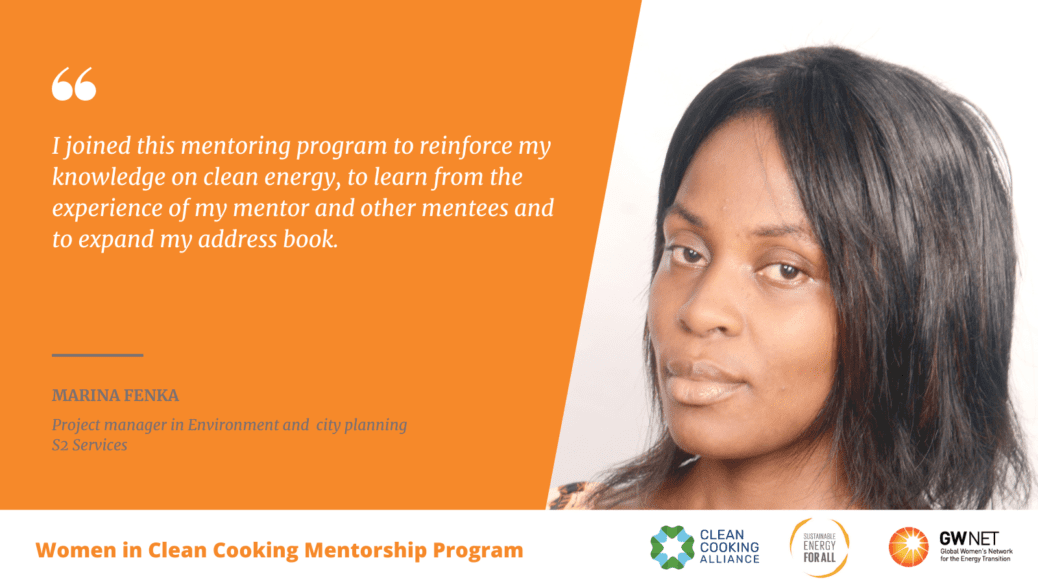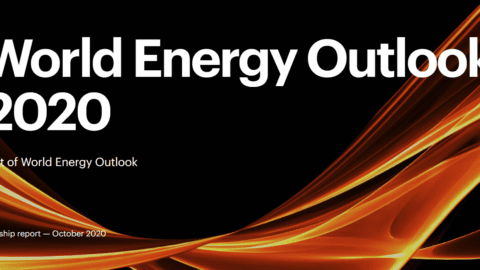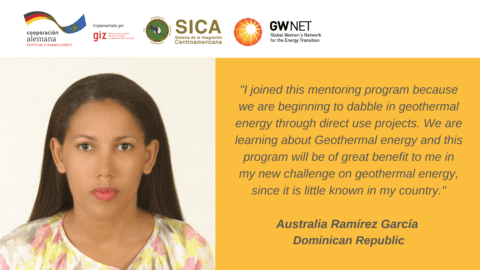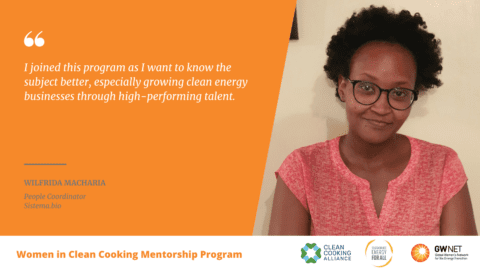GWNET brings you the 16th instalment of the “Meet the Women in Clean Cooking” series which celebrates the work and achievements of the women who are part of the Clean Cooking Mentorship Program. This program is made up of 30 mentee-mentor tandems, with mentees from over 15 countries. Meet Clean Cooking mentee, Marina Fenka, a Project Manager in Environment and City Planning at S2 Services in Cameroon
1) Tell us a little about yourself. What do you love most about what you do?
I hold a master’s degree in urban planning and development from the African School of Architecture and Urbanism in Lomé, Togo. I have been a gender and environment project manager at S2 services since July 2020.
Prior to S2, I worked in Nigeria in the public sector at the Anambra Local authority Board, in Cameroon in the private sector at Human Technology and Resources, and in Kenya at UN-Habitat.
At S2, one of my flagship projects is the production and distribution of cookstoves called Sweet Mother Stove in rural Cameroon, where we have already distributed more than 10,000 cookstoves to households. Knowing that many women have access to clean energy for cooking and at a lower cost, and also that they no longer endanger their health and have more time to devote to other things, is a joy that motivates me every day to excel in helping even more households. My career plan is to become a seasoned expert in renewable energy and gender.
2) What were your goals when you started working in clean cooking? How have these evolved?
When I started at S2, I wanted to improve the energy consumption of households in urban areas and to propose an alternative to the use of charcoal, which not only destroys the environment but also damages the health of the population, especially women (more than 90% of Cameroonian women in urban areas use wood derivatives for cooking).
But once I started, I realized that rural areas were even more affected by the problem of access to energy; especially since only 26% of the rural population has access to electricity in my country – wood is not only used for cooking, but also for lighting.
Many trees are cut down for energy purposes. The population, and especially women, travel for miles to fetch wood – some are raped while searching for wood in conflict zones. In addition, many of these women suffer from respiratory diseases.
Since then, my work has focused on rural areas, specifically on how to make cookstoves, as well as developing alternative sources of sustainable and affordable energy for food and lighting.
3) What are the opportunities for clean cooking in your country?
The Cameroonian government has committed to addressing the issue of sustainable energy. Cameroon made commitments at COP 21, and to this end aims to increase the share of renewable energy in its national energy mix from less than 1% in 2010 to 25% in 2035, and a department dedicated to the development of renewable energy sources (DERME) has been created.
Rural women are eager to improve their livelihoods; they are open to training, building capacity, etc. The sector is new and therefore represents a great employment opportunity for young people, especially young women. Cameroon has various resources (a young population, the sun, wind, etc.) which are avenues to explore for clean cooking and are still under-exploited.
There is very low technical and financial support in this sector. The sector is not really known and it is not advertised in the media, so very few investors are interested in it.
Added to this, there is an ongoing political and social crisis in the far north, north-west and south-west. This hinders the implementation of projects in these areas.
As far as the legal framework is concerned, no framework has been set up to regulate the activities of the sector despite the fact that Cameroon has ratified numerous conventions for the fight against climate change and access to renewable energies.
Access to data is also one of the major challenges. The essential data for pre-project studies are either non-existent or inaccessible. It should also be noted that there is very little research carried out in Cameroon in the clean cooking sector.
In 5 years time, I would like to contribute in one way or another to the manufacture and distribution of cookstoves to 1 million households in Cameroon, either as a contractor or as an employee in a company.
This mentorship will first allow me to learn how to communicate about what I do in order to attract more investors in this sector and to motivate other people to join the sector even if they do not have a background in energy.
Moreover, the training I will receive during this program will also be transferred to people already in the domain or wishing to be in the domain.
The experiences of other participants will help me to readjust and readapt my way of working in order to better affect my community and my environment.
6) What advice would you give to women hoping to join the clean cooking sector?
Get involved. There is so much to do and there are almost no women, there is space for everyone. It is a new sector but one that has a considerable impact on our lives and unfortunately does not have enough visibility.
Rural women are volunteers, they want to learn and they need you. On the other hand, be patient, daring, devoted and hard-working because at the stage our country is at, it is more a matter of fieldwork (to experience the realities) and less bureaucracy.
Read more about GWNET’s mentoring programmes here.











